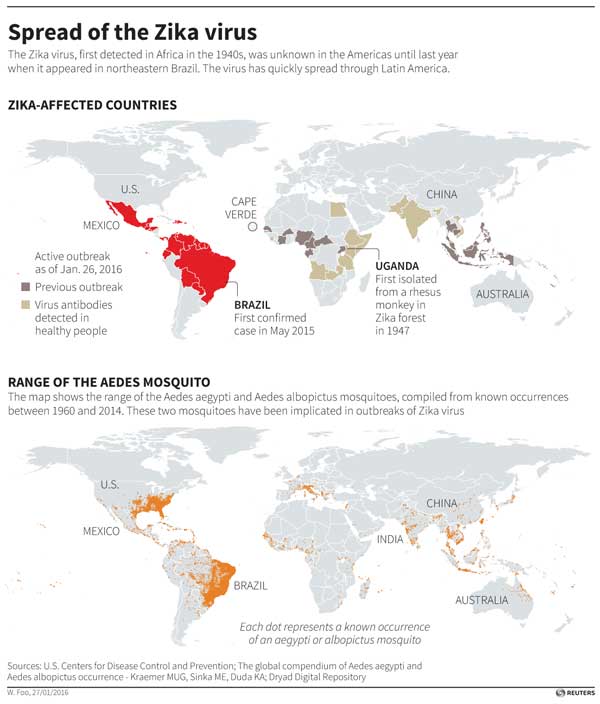Tuesday Feb 24, 2026
Tuesday Feb 24, 2026
Friday, 29 January 2016 00:32 - - {{hitsCtrl.values.hits}}
By Uditha Jayasinghe
Screening international arrivals for the Zika virus will commence at the Bandaranaike International Airport (BIA) within the next few days, the Health Minister said yesterday. 
Health Minister Dr. Rajitha Senaratne told reporters his ministry was looking at ways to start screening potential Zika carriers to Sri Lanka in the wake of 26 countries reporting cases around the world.
Zika is related to yellow fever and dengue. An estimated 80% of people that have it have no symptoms, making it difficult for pregnant women to know whether they have been infected.
The World Health Organisation has convened an emergency committee to discuss the “explosive” spread of the Zika virus, which has been linked to thousands of birth defects in Latin America.
“Last year the disease was detected in the Americas, where it is spreading explosively,” Margaret Chan, the WHO director general, was quoted as saying, at a special briefing in Geneva. It was “deeply concerning” that the virus has now been detected in more than 20 countries in the Americas, she added.
The spread of the virus has prompted governments across the world to advise pregnant women against going to the areas where it has been detected. There is no vaccine or cure for Zika, which has been linked to microcephaly, a serious condition that can cause lifelong developmental problems.
The committee will meet on Monday and will advise on the international responses and specific measures in affected countries and elsewhere.
Since September, Brazil has registered nearly 4,000 cases of babies with microcephaly. Brazilian President Dilma Rousseff has pledged to wage war against the Aedesaegypti mosquito that spreads the virus, focusing on getting rid of the insect’s breeding grounds.
Lawrence Gostin, a public health law expert from Georgetown University, warned that Zika has an “explosive pandemic potential.”
Reuters: The World Health Organization (WHO) expects the Zika virus, which is spreading through the Americas, to affect between three million and four million people, a disease expert said on Thursday.
The WHO’s director-general said the spread of the mosquito-borne disease had gone from a mild threat to one of alarming proportions.
Marcos Espinal, an infectious disease expert at the WHO’s Americas regional office, said: “We can expect 3 to 4 million cases of Zika virus disease”. He gave no time frame.
There is no vaccine or treatment for Zika, which is a close cousin of dengue and chikungunya and causes mild fever, rash and red eyes. An estimated 80 percent of people infected have no symptoms, making it difficult for pregnant women to know whether they have been infected.
WHO Director-General Margaret Chan said the organisation’s will convene an emergency committee on Monday to help determine the level of the international response to an outbreak of the virus spreading from Brazil that is believed to be linked to severe birth defects.
“The level of alarm is extremely high,” Chan told WHO executive board members at a meeting in Geneva. “As of today, cases have been reported in 23 countries and territories in the (Americas) region.”
Brazil’s Health Ministry said in November 2015 that Zika was linked to a fetal deformation known as microcephaly, in which infants are born with abnormally small heads
Brazil has reported 3,893 suspected cases of microcephaly, the WHO said last week, more than 30 times more than in any year since 2010 and equivalent to 1-2 percent of all newborns in the state of Pernambuco, one of the worst-hit areas.
Chan said that while a direct causal relationship between Zika virus infection and birth malformations has not yet been established, it is “strongly suspected”.
“The possible links, only recently suspected, have rapidly changed the risk profile of Zika from a mild threat to one of alarming proportions,” she said.